This post was submitted by my Rutgers colleague, Dr. Julia Sass Rubin.
Imagine turning your public schools over to a private corporation that is unaccountable to your community; has no experience educating children like those attending your public schools; and forces most of the boys to leave before graduation?
That is exactly what the Christie Administration is doing in Camden.
The Administration is transferring control of public education to three out-of-state charter corporations — KIPP, Mastery and Uncommon Schools — that are completely unaccountable to the people of Camden. The corporations will take hundreds of millions of taxpayer dollars from existing Camden public and charter schools to build or renovate and operate 16 new renaissance charter schools.*
The three charter corporations are aggressively marketing themselves and their new facilities to Camden parents and could quickly account for 9,300 of the district’s almost 15,000 publicly-funded spots, leading to the closure of the majority of Camden’s public and charter schools.
However, the students these corporations currently educate in New Jersey and Pennsylvania look nothing like Camden’s public school students. Ninety-two percent of Camden District’s students live at or below the poverty line; 19% have special needs; and 9% have limited English proficiency. Across the board, KIPP, Uncommon and Mastery educate a significantly less challenging student population.
Even more alarming are the charter corporations’ extremely high attrition rates. The attrition is particularly problematic for boys. Between 5th and 12th grades, KIPP loses one out of two boys and up to 58 percent of Black boys; and Uncommon loses almost 70 percent of all boys and as many as three out of four Black boys.
Such extraordinary attrition rates may reflect the rigid teaching and discipline techniques used by these charter corporations. Whatever the cause, having KIPP, Mastery and Uncommon take over the majority of Camden public schools will almost surely result in hyper-segregation, with special needs, Limited English Proficient, and male children most likely to be pushed out of the renaissance charters and into a few “repository” public schools that remain open to hold the students these corporations reject.
We know from the experience of Detroit and New Orleans that, once the local public schools are gone, there is no way to get them back.
Camden parents can stop the destruction of their public schools and the hyper-segregation of their children by refusing to send them to the renaissance charters, even though those private facilities will be much higher-quality than the Camden public school buildings, which the Christie Administration has refused to maintain or replace. In the short term, parents rejecting the renaissance charters is the most effective way to keep Camden public schools open. Longer term, Camden residents will have to reclaim political control of their public schools.
Renaissance charter corporations have no experience educating students with Camden demographics
As Exhibits 1 to 5 demonstrate, the children attending KIPP and Uncommon Schools in New Jersey are much less challenging to educate than the children attending Camden public schools. The KIPP and Uncommon students are much less likely to live in poverty; have significantly lower rates of special needs – particularly the most challenging and expensive to manage special needs; and are 100% English proficient. The charter school students also are much more likely to be girls, who score higher on standardized tests than boys and have lower drop out and discipline rates.

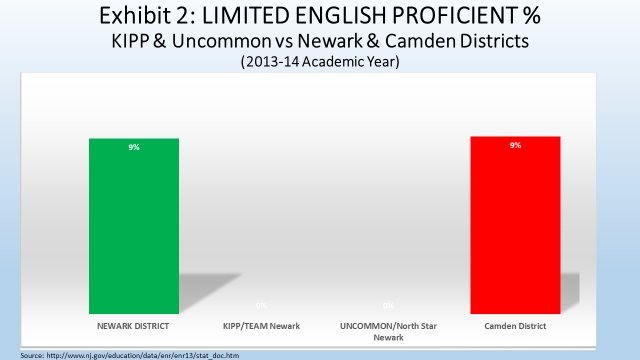
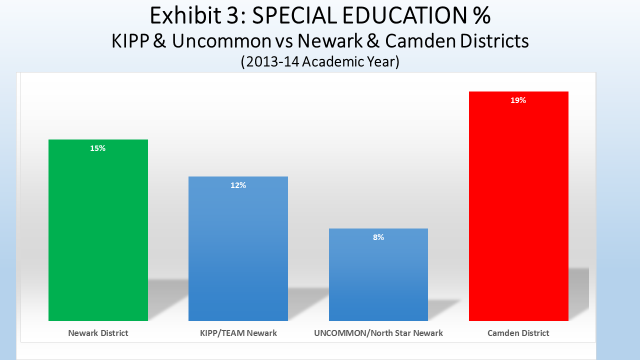
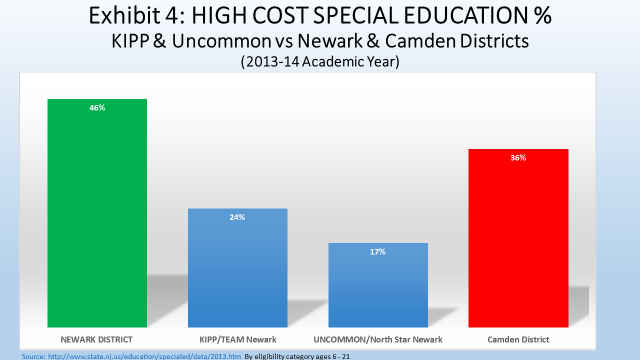
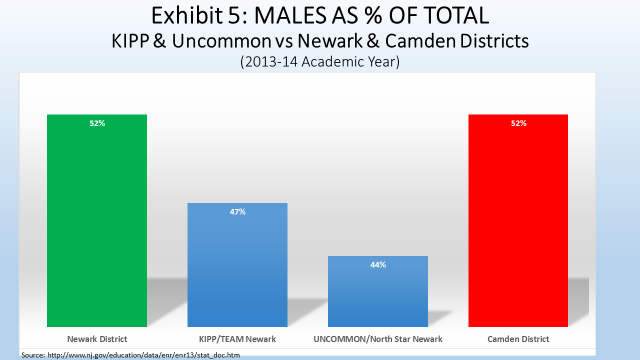
As with KIPP and Uncommon, the children attending Mastery – the third renaissance charter corporation – are much wealthier than the children of Camden. The eleven charter schools Mastery currently operates, all of which are located in Philadelphia, have an overall Free and Reduced lunch rate of 81% versus 95% for Camden (Exhibit 6).
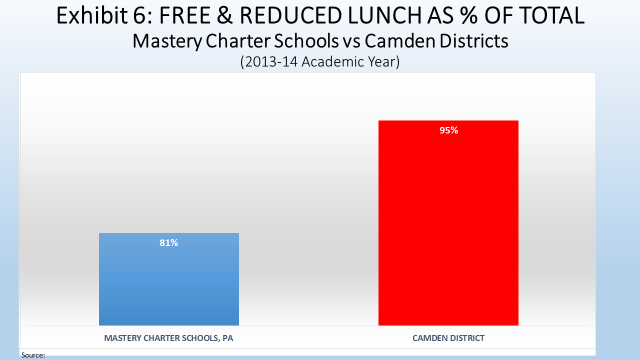
Charter corporations shed students, particularly male ones, at shocking rates
The experience of KIPP and Uncommon charter chains in Newark highlights that both have very high attrition rates, particularly for boys.
One out of every three students who attended KIPP Newark at the start of 5th grade are gone by the start of 12th grade (Exhibit 7). The attrition rate is even higher for Uncommon Schools, which loses as many as two out of three students between 5th and 12th grades (Exhibit 8).
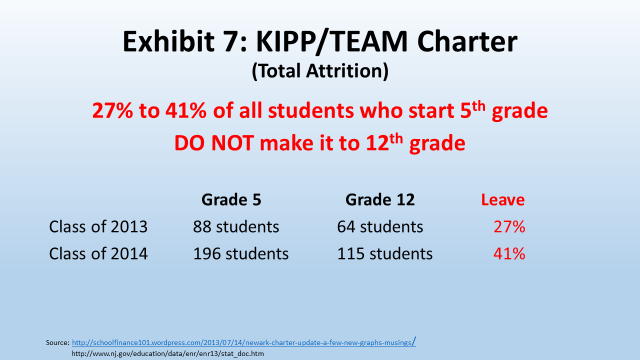
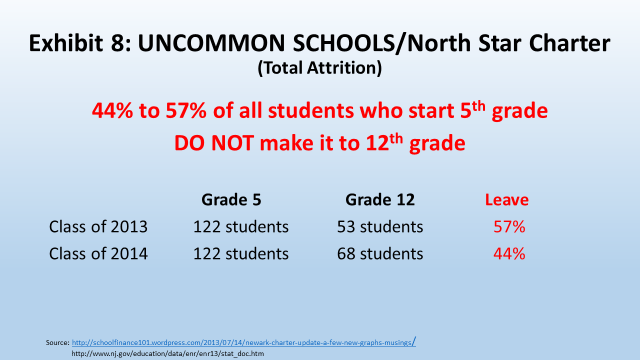 Most alarming are the attrition rates for boys at both schools. As exhibits 9 to 12 document, between 5th and 12th grades, KIPP loses 45 to 52% of all males and up to 58% of Black males, and Uncommon loses 62 to 69% of all males and up to 74% of Black males.
Most alarming are the attrition rates for boys at both schools. As exhibits 9 to 12 document, between 5th and 12th grades, KIPP loses 45 to 52% of all males and up to 58% of Black males, and Uncommon loses 62 to 69% of all males and up to 74% of Black males.
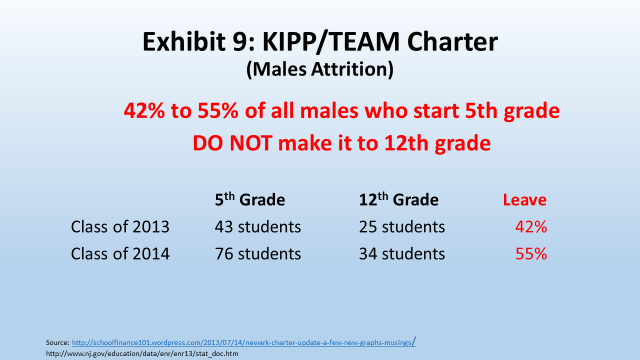
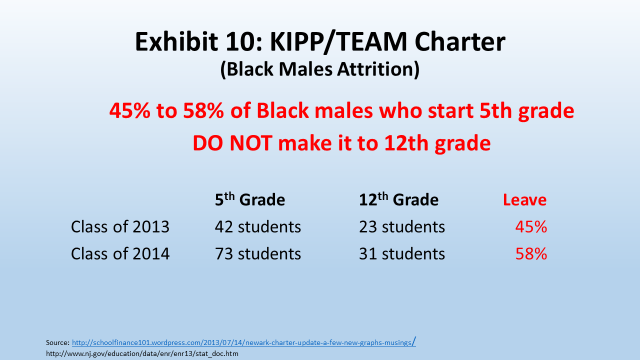
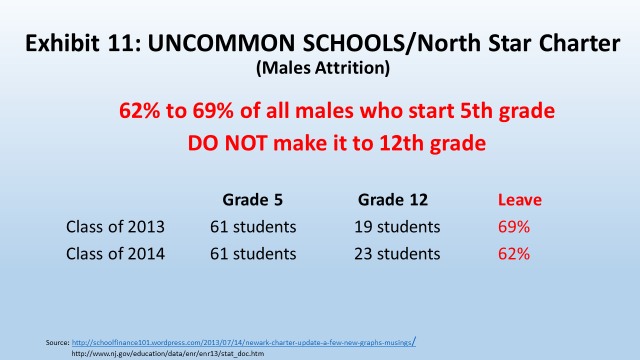
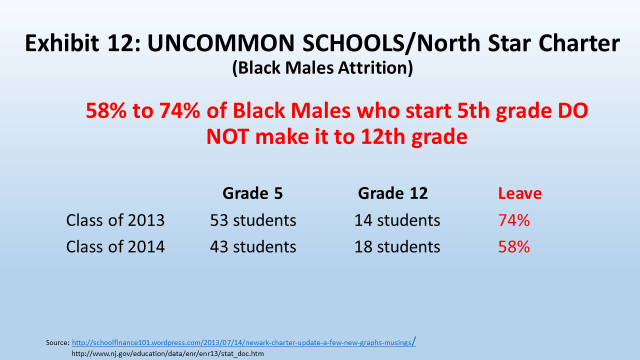 Not surprisingly, KIPP’s 2014 graduating class was only 30% male and Uncommon’s only 34% male (Exhibit 13).
Not surprisingly, KIPP’s 2014 graduating class was only 30% male and Uncommon’s only 34% male (Exhibit 13).
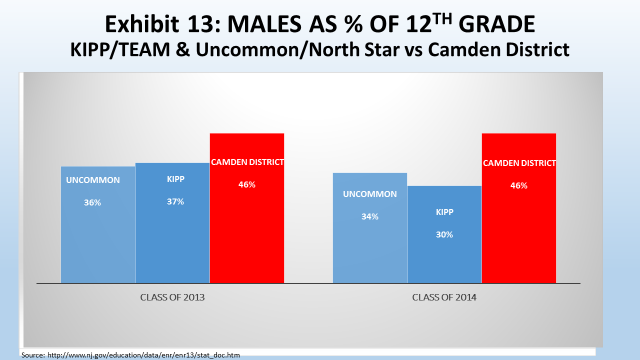
Charter corporations use rigid “NO EXCUSES” teaching and discipline techniques
KIPP, Mastery, and Uncommon charter corporations all subscribe to the “no-excuses” model of student management, which places a very heavy emphasis on rigid rules and strict discipline.
The following description of “No Excuses” student management techniques was written by a former 3rd grade teacher at such a charter school:
- “If my class was not behaving perfectly in the hallway—silent, hands by their sides, shirts tucked in, “holding the bubble” (cheeks puffed up so they were unable to speak)—I was to turn the children around and have them repeat that part of the walk through the hallway until they got it right.”
- “If the class was more than five minutes late to a special subject, the class should be turned around and go back to the regular classroom and miss the special.”
- “All this discipline in the hallway made it almost impossible to get from one classroom to the next on time.”
- “There is no intelligence involved on the part of the students, no critical thinking skills engaged, no independent thinking, no creativity.“
- ”When the teacher says, for example, “How do we use math,” and pauses, the students repeat, “How do we use math,” and the teacher then says, “Every day,” and the students repeat, “Every day.” Then the teacher claps three times and says, “Teach,” and the students clap three times and say, “Okay.”… Students then repeat what the teacher said … using the same words, the same intonation.”
The “no excuses” charter schools combine such rigid teaching techniques with harsh discipline. For example:
At KIPP:
- “shaming is used for infractions.”
- A misbehaving “student at KIPP is put on a ‘behavior plan’ that may mean having to wear a special distinguishable shirt and spending the day in silence, neither speaking nor being addressed… being forbidden to talk with others, being disallowed from sitting in a chair, or being required to eat separately and silently, stand in the back of the classroom during lessons, or write, ‘I will work and behave in the best way I know how and do whatever it takes for me and my fellow students to learn.’”
- “Public reprimands and collective confessionals, in addition to a penalty, are often required.”
At Mastery:
- “middle school … children tend to be tracked through merit and demerit cards… they receive blank merit and demerit cards every week to be carried on their person (around their necks), prepared to be marked by a teacher at any moment.”
- “Demerits are issued for such minor offenses as students having their shirts untucked or chewing gum.”
- “After six offenses, the student receives a 3-hour in-school detention.”
At Uncommon:
- “There are strict rules and regulations posted throughout the school regarding behavior in and outside the classroom.”
- “Pupils are encouraged to SLANT, which stands for sit-up, listen, ask, nod and track the teacher or speaker.”
- All students are given 50 ‘scholar dollars’ at the beginning of the week which can either be deducted for not following rules or increased if they complete extra tasks.”
- “Students who get more scholar dollars can sit at a cafeteria table with condiments and friends but those who have dollars deducted must eat lunch alone while doing homework.”
As Rutgers-Camden Professor Stephen Danley wrote so aptly, “It’s hard for me to … believe that militaristic, controlling techniques are in the best interest of students. This isn’t the type of education I loved as a student, it flies against everything I believe when teaching my college classes, and I would not send any child of mine to a school that emphasizes strict conformity over creativity. But there is a group of entrepreneurs who believe the best way to teach minority, urban students is by controlling them, having them mimic instructors, and insisting on 100 percent compliance. And we have invited those leaders to teach in our city.”
Julia Sass Rubin is an associate professor at the Edward J. Bloustein School of Planning and Public Policy at Rutgers University and a visiting associate professor of public affairs at the Woodrow Wilson School of Public and International Affairs at Princeton University.
*A fourth renaissance charter chain is likely to be approved next year, creating thousands of additional privately-managed educational spots within the district.
Isn’t it true that your child attends a charter school in Princeton? Sounds like a double standard to me. Since you have money, you are allowed to have options. I, a resident of Camden, do not have the same options. Interesting…
My child used to attend a charter school in Princeton. Why do you see that as a double standard? Pointing out the high attrition rates at these schools is not anti-charter.
Why must people pick sides between pro and anti-charter? That makes it very difficult to have a civil dialogue and to address problems such as the attrition highlighted in this post.
Dear Darryl,
This article is not meant to suggest that all charter schools are bad or that all Camden district schools are great.
I wrote it to highlight the problematic nature of the forced renaissance charter takeover of publicly-funded education in Camden, which will lead to the closure of most local charter schools like LEAP as well as Camden District public schools and will leave parents with no real options except the rigid and hyper-segregated “no excuses” charters.
I see a problem with the big corporate charter schools, but that is not true about all Charter schools. My son graduated from Camden Academy Charter School and it is a great school. A lot of their graduates went on to become teachers, lawyers, and community leaders. You also don’t mention Leap Academy which was started by a Rutgers Professor and is supported by Rutgers. I agree that all charter Schools are not created equal. My main reason for putting my children in Charter School, was because I wanted them in a safe, learning, environment. This was something that Camden Public Schools was not providing.